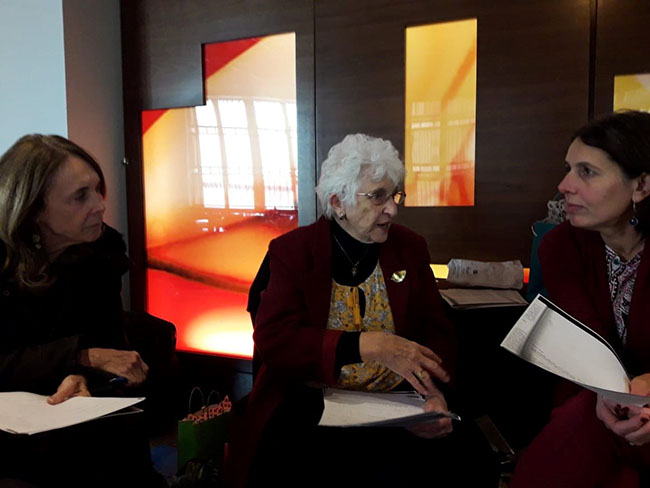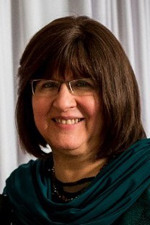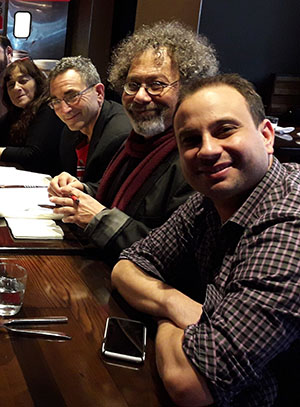


EFRAT, Israel — In April, the board members of the Alliance for Jewish Theater bit the bullet and decided to morph their annual autumn conference into a three-day Zoom event. Like everyone, they hoped for the best, but were being proactive and not assuming there would be a miracle.
Theater makers from the US, Canada, Israel, England, and Hungary, and panelists from those places and also from Mexico, will meet virtually on October 25-27. No need to travel to Washington or Boston or Philadelphia or Chicago, some of the cities where the AJT has held its conferences. For me, living in Israel and an attendee since 2017, and others like me who live scattered across America or the world, this will be a ray of light during a difficult time.
How does one create a theater conference online? In theater, unlike in film, the actors feed off of the audience energy. It is a give and take between the on stage and off-stage participants.
Jeremy Aluma, the executive director spearheading the conference organization, of Chicago, says, “We are excited about the accessibility the virtual format provides…In difficult times, we come together. Whether we call it a pod or a bubble, a tribe or a village, the truth remains: community is where we receive the support and the nurturing we need to thrive.” Throughout this pandemic, AJT has held webinars and group Zoom meetings between artistic directors, playwrights and others.
Aluma says that AJT saw a record rise in membership over the last six months because, “People want to connect. Even in this online, virtual, socially-distanced, and masked world, we have found a way to connect through Jewish theatre. The pandemic has destroyed many things, but one of the silver linings is that it’s allowed us to more easily connect with theatre artists making Jewish content from around the world.
“There will be a playwriting workshop; a session on how to get work produced; an anti-racism training; a panel discussion about establishing diversity in culturally-specific theatres; updates about Jewish theatre making in Israel and around the world; opportunities for networking; and scintillating performances.” The full program is on the AJT website (alljewishtheatre.org). A full conference pass is $75 but one can also register for individual sessions.
There were more than 100 submissions for online performances, ranging from five minutes to an hour and a half, pre-recorded or to be performed via Zoom, that came in from 50 cities and seven countries — US, Canada, Israel, England, Australia, New Zealand, and Uruguay. As every year, there will be a group of younger theater people, called “Theatremachers,” who come at a reduced cost to learn from others, and there will be breakout networking sessions based on participants’ regions and their professional roles.
Some past guest speakers or guests at AJT conferences have included Carl Reiner, Theodore Bikel (of blessed memory), Adam Kantor (“The Band’s Visit”), and Tovah Feldshuh; the latter three became honorary board members.
The background of AJT members is as eclectic as their geographical locations. Aluma, who has an MFA in Directing from the Theatre School at DePaul University, is a Jewish-American theatre director of Iraqi descent. He founded the international Four Clowns and has directed shows in Brazil, New York City, Chicago, San Francisco, Phoenix and Las Vegas.
Hank Kimmel, the president of AJT, is a former tennis pro and an attorney who has a practice as a mediator, and is also a founding member and board president of Working Title Playwrights, an Atlanta-based theatre company dedicated to the development of new plays.
Kimmel’s vision as president is, “To create a world-wide network of theatre artists who share, engage and connect with their communities through the ministry of theatre through Jewish values.” He says, “When I got involved with the AJT, I was a ‘lowly’ playwright who was only peripherally connected to Judaism and creating work with a Jewish sensibility. Being part of this network has allowed my connections to both Judaism and theatre to deepen.
“Strangely, it’s been a robust time for the AJT. We’re a connecting organization and since folks have been ‘virtually’ stranded, we’ve been able to help people connect from all over the world. At every [online] event, we have folks from at least ten states and three-four countries.” They were already geographically diverse, and making virtual connections, but, “The pandemic accelerated our approach. Even when the world shifts back to its former state, we believe the partnerships, collaborations that have made will continue. There has been a pooling and incubation of ideas and artists.”
The AJT is seeking to include Jewish theater people of color, and more of Sephardic origin. Debo’rah Eliezer, one of the latter, performed last year, and will be moderating a session this year.
The idea for the AJT began in 1979 and the first conference was in 1980. Professor David Chack, the immediate past executive director, took the reins in 2011 and is still a driving force in the organization. He is the Producing Artistic Director of the ShPiel theater company in Chicago, where the conference was hosted last year. Chack’s doctoral work was under Elie Wiesel at Boston University. He has written extensively on theatre and Jewish culture, lectures at the Theatre School at DePaul University on Jewish and Holocaust theatre, and gives a seminar on Identity Theatre. He is also a Conservative chazan (cantor).
Professor Shack was also the first person I connected to in AJT.
A number of years ago I discovered the AJT online. I loved their site and their articles, but I live in Israel and – with one exception — their annual conferences have been held in America. The timing always conflicted with my teaching or performance schedule of our Raise Your Spirits Theatre company, whose shows I direct.
And then two elements converged in 2017: I took a break from frontal classroom teaching, and our show season was moved. Now was the time to attend a conference. And it was in Boston that year, a city I love. I wrote to David telling him I was thinking of coming, and he wrote back, “It will be wonderful to have you from Israel.”
Five weeks later, I hesitantly crossed a tree-lined street, rich with fall foliage, and entered the Hillel building of Boston University, not knowing what to expect. I was the only Israeli, and one of less than a handful of Orthodox Jews in the room. One of those few was Yoni Oppenheim, Co-Founding Artistic Director, 24/6: A Jewish Theater Company, of New York.
That fact didn’t daunt me. For years I had worked for the Gesher organization, whose goal is to bridge the gap between people across the religious spectrum of Israeli society. But many Israeli theater makers are strongly secular, so I didn’t know what to expect from these theater makers.
At the AJT conference, I discovered an entire community of theater makers whose Jewish identity – across the Jewish spectrum — informed their theater, and who were passionate about Jewish theater (which is different from theater that is created by Jews, though they sometimes coincide). A family of kind, vibrant, eclectic creatives whose language I understood and spoke, and nobody seemed to care about our differences; they only enriched the conversation. There was openness and camaraderie. There were people there from the east and west coasts, but also from Oklahoma, Indiana, Ohio, Missouri, Illinois, and elsewhere. They were from small theaters and large theaters, from well-funded theaters and from theaters that struggle for their financial existence.
The age ranged from 20-somethings to (a few) grandparents. In one session, while introducing ourselves, we said where we were from and sometimes added a bit about our families. One man mentioned that he now had a grandchild. Mazal tovs were happily offered. I said that I also had grandchildren. A woman asked me, “How many?” I broke the Jewish “against the evil eye” rule and mumbled, kind of quietly (I didn’t know if they’d believe me), “Eighteen.” (Four more since then, God be praised.) Their jaws hit the ground.
So there I was, an Israeli grandmother of “chai” grandchildren, interacting with Danielle Witsansky, a young theater maker from Florida with a specialty in Holocaust education, with Deborah Baer Mozes, Artistic Director of Theatre Ariel, Philadelphia, who since then has become a dear friend (and now has a daughter in Israel), and with Ronda Spinak, Artistic Director of the Jewish Women’s Theatre, Los Angeles, who had an influence on how I staged a new show I was working on at the time, Mikva the Musical, Music and Monologues from the Deep. Where else would I have connected so closely with Wendy Kout of California, an award-winning writer-producer of theater, film and television. And I too joined the program the last few years, as a panelist and workshop presenter, and during COVID, by giving a webinar.
These relationships do not end at conferences. We support each other by attending (now — online) performances and keeping in touch outside the framework of AJT.
Theater has the capacity to unite and to bring some healing to our fractured world. May it be so at this conference also. To register for the conference, use this link.
*
Toby Klein Greenwald is a member-at-large of the AJT board, and of the board of ATARA (The Arts and Torah Association). She is an award-winning theater director and a recipient of awards for Excellence in Jewish Journalism from the American Jewish Press Association.